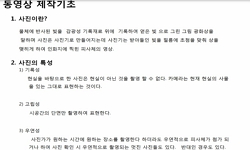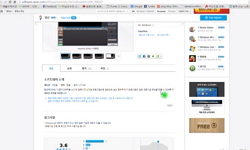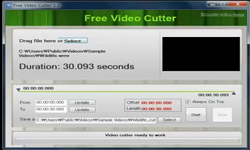최근 3차원 동영상 표시장치에 대한 연구가 급속히 진행됨에 따라 스테레오 영상 압축 및 복원에 대한 연구도 여러 분야에서 관심의 대상이 되고 있다. 스테레오 영상의 경우 단일시점 영상...
http://chineseinput.net/에서 pinyin(병음)방식으로 중국어를 변환할 수 있습니다.
변환된 중국어를 복사하여 사용하시면 됩니다.
- 中文 을 입력하시려면 zhongwen을 입력하시고 space를누르시면됩니다.
- 北京 을 입력하시려면 beijing을 입력하시고 space를 누르시면 됩니다.
적응형 대역폭 제어를 이용한 스테레오 동영상 부호화 기법 = Stereoscopic video codingtechniques using adaptive bandwidth control
한글로보기https://www.riss.kr/link?id=T8343903
- 저자
-
발행사항
서울 : 서강대학교 대학원, 2002
- 학위논문사항
-
발행연도
2002
-
작성언어
한국어
-
주제어
적응형 대역폭 제어 ; 스테레오 ; 동영상 ; 부호화 기법
-
KDC
566.74 판사항(4)
-
DDC
621.3 판사항(19)
-
발행국(도시)
서울
-
형태사항
58p. : 삽도,챠트 ; 26cm
-
일반주기명
참고문헌: p. 56-58
- 소장기관
-
0
상세조회 -
0
다운로드
부가정보
국문 초록 (Abstract)
본 논문에서는 기준영상 (왼쪽 영상)과 시점이 다른 영상 (오른쪽 영상)간에 공유 대역폭 제어를 적용하여 예측이 수행되는 매크로블록들간의 양자화계수를 적절히 선택함으로써 전체적인 스테레오 동영상의 화질을 개선할 수 있는 방법을 제안한다. 이를 위해 먼저 기존의 동영상 압축 기법에 변이 예측을 적용하여 동일한 시간에 취득된 좌, 우 영상간의 정보의 중복성을 제거하는 과정을 수행하며, 버퍼제어를 이용하여 각각의 블록에 대한 비트율과 양자화 오차를 얻는다. 제안한 알고리듬에서는 이러한 결과들로부터 양자화 계수를 조절하여 주어진 비트율에 대해 오차가 가장 작아지도록 대역폭 할당을 제어하게 된다. 각 단계마다 기존의 동영상 부호화기법과 제안한 방법에 대해 압축율, 화질평가 및 수행시간 등을 실험적으로 비교하였다. 움직임이 많거나 화면전환이 발생할 경우 변이 예측이 많아지며 이러한 경우 제안한 방법이 기존의 방법들에 비해 보다 나은 성능을 보임을 확인할 수 있다.
최근 3차원 동영상 표시장치에 대한 연구가 급속히 진행됨에 따라 스테레오 영상 압축 및 복원에 대한 연구도 여러 분야에서 관심의 대상이 되고 있다. 스테레오 영상의 경우 단일시점 영상에 비해 정보량이 두 배로 늘어나기 때문에 이를 전송하기 위해서 요구되는 대역폭도 커지게 된다. 따라서 스테레오 영상에 대해 전체적인 데이터 량을 줄이기 위한 효율적인 영상압축기법이 연구되고 있다.
본 논문에서는 기준영상 (왼쪽 영상)과 시점이 다른 영상 (오른쪽 영상)간에 공유 대역폭 제어를 적용하여 예측이 수행되는 매크로블록들간의 양자화계수를 적절히 선택함으로써 전체적인 스테레오 동영상의 화질을 개선할 수 있는 방법을 제안한다. 이를 위해 먼저 기존의 동영상 압축 기법에 변이 예측을 적용하여 동일한 시간에 취득된 좌, 우 영상간의 정보의 중복성을 제거하는 과정을 수행하며, 버퍼제어를 이용하여 각각의 블록에 대한 비트율과 양자화 오차를 얻는다. 제안한 알고리듬에서는 이러한 결과들로부터 양자화 계수를 조절하여 주어진 비트율에 대해 오차가 가장 작아지도록 대역폭 할당을 제어하게 된다. 각 단계마다 기존의 동영상 부호화기법과 제안한 방법에 대해 압축율, 화질평가 및 수행시간 등을 실험적으로 비교하였다. 움직임이 많거나 화면전환이 발생할 경우 변이 예측이 많아지며 이러한 경우 제안한 방법이 기존의 방법들에 비해 보다 나은 성능을 보임을 확인할 수 있다.
다국어 초록 (Multilingual Abstract)
In this thesis, we propose an effective algorithm that improves the quality of stereoscopic video sequences, in which proper quantization parameters (QPs) are selected for a pair of corresponding macroblocks (MBs) in left and right images. First, using disparity estimation, the proposed algorithm reduces the "binocular" redundancy between the left and right images acquired from different view angles and extracts the information about the bit rate and the distortion using buffer-constrained bit allocation. Then it adaptively determines QPs and the bandwidth for encoding of each view to minimize the total distortion. In each stage, the proposed algorithm is compared with the conventional video encoding methods in terms of the compression ratio, video quality, and processing time. Especially, for video sequences containing a lot of moving blocks and scene changes, the proposed algorithm shows better performance than the conventional methods in terms of disparity estimation and adaptive bandwidth control.
According to recent advances in three-dimensional display systems, interest in stereoscopic video coding and reconstruction has been increased in various fields of video processing. Since the stereoscopic video sequence requires double the information...
According to recent advances in three-dimensional display systems, interest in stereoscopic video coding and reconstruction has been increased in various fields of video processing. Since the stereoscopic video sequence requires double the information rate compared with the single-view video sequence, the bandwidth required to transmit the encoded stereoscopic bitstream is larger. Thus, efficient video coding techniques for stereoscopic sequences have been investigated to reduce the amount of data.
In this thesis, we propose an effective algorithm that improves the quality of stereoscopic video sequences, in which proper quantization parameters (QPs) are selected for a pair of corresponding macroblocks (MBs) in left and right images. First, using disparity estimation, the proposed algorithm reduces the "binocular" redundancy between the left and right images acquired from different view angles and extracts the information about the bit rate and the distortion using buffer-constrained bit allocation. Then it adaptively determines QPs and the bandwidth for encoding of each view to minimize the total distortion. In each stage, the proposed algorithm is compared with the conventional video encoding methods in terms of the compression ratio, video quality, and processing time. Especially, for video sequences containing a lot of moving blocks and scene changes, the proposed algorithm shows better performance than the conventional methods in terms of disparity estimation and adaptive bandwidth control.
목차 (Table of Contents)
- 목차 = ⅰ
- Abstract = ⅵ
- 요약 = ⅶ
- 제1장 서론 = 1
- 제2장 예측 부호화 방법 = 4
- 목차 = ⅰ
- Abstract = ⅵ
- 요약 = ⅶ
- 제1장 서론 = 1
- 제2장 예측 부호화 방법 = 4
- 제1절 MPEG-2 동영상 부호화 = 5
- 1. MPEG-2 비디오 계층 = 7
- 2. 움직임 예측 및 보상 과정 = 10
- 제2절 스테레오 영상의 특성 = 12
- 1. 스테레오 영상의 취득조건 = 13
- 2. 움직임예측과 변이예측의 비교 = 14
- 제3절 스테레오 동영상 부호화 = 16
- 1. 변이 예측 방법의 비교 = 16
- 2. 움직임 예측과 변이 예측의 조합 = 18
- 제3장 차영상 부호화 방법 = 22
- 제1절 차영상 부호화 과정 = 22
- 1. DCT = 22
- 2. 양자화 = 24
- 3. 가변길이 부호화 = 24
- 제2절 비트율 제어 = 25
- 1. 목표 비트 할당 = 26
- 2. 비트율 제어 = 27
- 3. 적응 양자화 = 28
- 제4장 적응형 대역폭 제어 = 30
- 제1절 적응형 대역폭 제어 = 31
- 1. 의존적인 영상간의 비트율-왜곡 특성 = 32
- 2. 비트율 제어 알고리듬의 수식적인 정의 = 34
- 제2절 적응형 대역폭 제어를 이용한 부호화기의 구성 = 38
- 제5장 실험결과 및 토의 = 41
- 제1절 예측과정에 의한 성능평가 = 41
- 제2절 대역폭 제어에 의한 성능평가 = 47
- 제5장 결론 및 추후 과제 = 55
- 참고문헌 = 56












